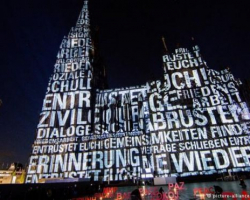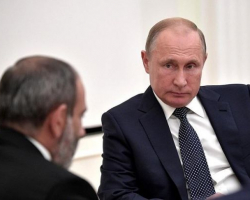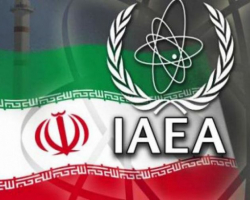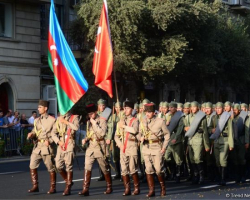
Introduction
Firstly, in order to research EU and Russia political approaches on South Caucasus area, it should be analyzed political situation during USSR period; this period coincided with former president Gorbachev, who had been ruled the USSR from 1985. He followed different policy way during his presidency to control the region that brought the end of the Soviet. Gorbachev selected the strategy of the nearing to the West to do Soviets more democratic, but he didn’t know that was the end of communist system. (Hasanov, 1998:194-198)
So this attempt resulted lots of cooperation and agreements between EU and Russia.
The order of the world had begun to change with some big factor such as collapse of Berlin wall, Warsaw treaty and fall of communism. It was created new term a ‘globalization’ that gives the states more independence without and border between them. EU began to strongly support this action according to its purpose of organization. (Iskenderov, 2009:1)
EU was far from the Eastern countries more than the West due to some reasons, however continued to support all of uprising movement to get democracy. Maybe this situation came to its business. Because of the factor of Russia, EU did not take advantage of energy sources of SC. Against EU’s action Russia applied the TACIS (Technical Assistance to Commonwealth of Independent States) program to support and assist the independent state during democrat ions process.
In the post-Soviet era, in the 19th century South Caucasian’s three states (Armenia, Azerbaijan and Georgia) already gained the independency and this situation created a rival background to start competition between the European Union (EU) and the Russian Federation (RF) (Lurea, 2014/2015:1). These powerful players in the policy arena did not look with favor on against political competition in the South Caucasia region. If we contrast both the Russia and the EU, Russia is an internal actor in the South Caucasian location according to EU’s power and also has been authority within South Caucasian three states, is convenient to get more competence and reach to real its purposes. The collision of competition among both power actors in the territory increase rapidly year by year and both actors want to maintain the rivalry whereon the South Caucasus.
If we look at the geopolitical location of the South Caucasus, it is located in an important critical region, which combines the West with the East and binding the federation of the Russia with the Middle East area. Therefore in the region had been a conflict place for outer actors such as RF and EU during the history of all times.
After 1991 South Caucasus’s importance began to enhance for other powerful states and organizations. From time to time EU and RF’s authorities could be changeable over the region but most of the time the RF has been a first power for the South Caucasus region’s countries. For instance during the Soviet period, RF was eventual management organ that all of powers are collected to rule the people living in the region. (Cornell, 2001:1)
These states had been under the RF’s rule for years, Azerbaijan, Georgia and Armenia were an integral a component of the Russia only 1918 and 1921 year we’re not including to this. That time these states were independent states but it did not long. So during in the 1918-1921 years had less intercourses EU or Western states with the area of the Caucasus because of the domination of soviet Russia in the district. (Şafak, 2015:8)
With the collapse of the Soviet Union, Azerbaijan, Georgia and Armenia, which gained independence in the Caucasus, have become effective actors in the new period. In the Caucasus, where regional powers and large non-regional states are particularly interested in rich energy resources, it is desirable to try different policy alternatives from power balance politics to regional cooperation, both to consolidate their independence and to protect their interests. However, states in the South Caucasus according to ethnic-based problems and their power balance policies, against threating the territorial integrity of the countries, have not been able to cooperate for effective and regional integration. Azerbaijan and Georgia faced a serious threat against to their territorial integrity, which negatively affected their internal political stability. (Kasım, 2015:52-53)
Russia and the South Caucasus
Russia has always been engaged to the region through centuries. At the end of the cold war, Russia became economically weak, lost both ideological context and its political system and separated into 15 different independent states. It lost its influence even on neighboring countries and domestic stability of Russia became under danger.
Russian policy in the South Caucasus is often criticized for the lack of clear goals, consistency, unpredictability and inflexibility. However, the analysis of this policy over the past twenty years since the collapse of the Soviet Union shows that most of these accusations are in fact lacking sufficient grounds. Despite the seeming inconsistency, Russia’s policy was clearly focused on preserving its role as a leading power in the region. At the same time, the main tasks were to counter the threats to the Russian Federation’s security coming from the South and to make sure Russia’s dominance on the routes of energy transit from Central Asia and the Middle East to Europe. But these tasks carry out in different periods had built in different ways, depending on the rapidly changing realities of the South Caucasus. Russian foreign policy implements in this region, it seems that specific principles have developed. (Rıabov, 2005)
In order to establish an influence in the region, Russia was applied strategy of the “divide et empera” (divide and rule) and now still using this strategy towards the nations, who had been under the Soviet Union? Russia had done some activity in the region to keep its impact and to provide mediation and peace to ensure the importance of the role. But, the power structure of the countries of the region, which Russia can now carry out in the Caucasus, and to make some changes in power distribution. (Gaddis, 1992:21-38)
Since the collapse of the Soviet Union, threats to ethnic conflicts and territorial integrity of regional countries have emerged as the most important factors of instability. It has increased. On the other hand, it is necessary to re-establish the former dominion in the region to interfere with other non-regional forces, Russia as an important actor who influences and thus determines regional security showed itself.
Facing economic, political and social problems after the declaration of independence, Armenia has tried to further develop its relations with Russia. Russia has supported Armenia economically, politically and militarily, which defended its interests in the Caucasus. Georgia and Azerbaijan have tried to integrate into the international political and economic system, giving Russia the struggle to get rid of the military and political influence. Armenia, on the other hand, defended the interests of RF.
Meanwhile, some governments, heads of state and research centers in the South stability pact projects in the hope that the Caucasus will provide lasting peace and stability they suggested. But the factors that prevent such proposals from succeeding are still is not available. Relations between Russia, Georgia, Azerbaijan and Armenia determining the balance of power and interests and the non-regional forces towards the South Caucasus long-term stability in the Southern Caucasus as long as the Russia’s ambitions continue, it will be quite difficult.
The EU and South Caucasus
İn terms of energy efficiency the region attracted EU’s attention which is very important issue for all of the developing states. Therefore it is caused some discusses and interest on the South Caucasus area due to variety of the energy resources. İn the region petroleum and gas reserves keep in the collaboration mood and closer with other important EU’s member states. That’s why SC had exposed significant changes in the past years coming decade the region will experience major changes coming because of large oil and gas opportunities that is a big tool for the SC’s states to increase their economic level and place among the other regions powerful states like Turkey, Iran. İt is too substantial factor for to be dominant actor inside of influential region’s states. (Ibrahimov, 2008:76-77)
Of course it is certain that EU has many causes to get the control over the South Caucasus region.
Caucasus is located in the suitable geographic place, where has very important status, according to the geographical status the region is situated on the cross roads, this control the East-West carrying trade ways. These advantages are made the Caucasus is very major area.
Moreover, in this region’s states, in advance being powerless and undecided, are just able of supply safety thanks to cooperation together with EU partners in the common thoughts against terrorism, trafficking in human being, gun etc. ın order to keep peace on the world. (Şahbazov, 2015:187)
The Caucasus become same boundaries with effective territorial potential states, for instances Russia and Iran, who are in the central point of the transnational interest. Turkey’s existence, who is member of NATO and a nominee to EU participation, has some significance for EU (Kasım 2015, p. 52). We can say The South Caucasus lays a strategic bridge betwixt the ethos and human development and supporter of enlightenment onwards to the East and West, carries little importance for EU, than as an energy maker or military center. (Gaddis, 1991:102-122)
Thus, in the circumstances, the definition of the EU connections on the states of South Caucasus continues on the other side of the unbiased defined in the ENP planned official papers as lengthening “the stability, security and well-being of all concerned”. (European Neighborhood Policy Strategy Paper, 12.5.2004)
In investigate of this kind of a way, has a requirement to analysis the previous and the present links of the EU with the three state of the South Caucasus and their impact on the growing process inside of the states.
SC’s state Georgia and Azerbaijan are enthusiastic to combine with the West. Georgia’s former leader and Prime Minister Zurab Zhvanianihai said in his interview that, Georgia as a state would like to join the EU, there are various occasion to come into the EU (Demirag, 2004:104). Also, expressed his thoughts with these words “Georgia still has time to get membership from EU”, Azerbaijan and Georgia cannot make the demands of agreement with the West Karabakh issues of the Karabakh and South Ossetia without reaching results, separately.
Russia-EU Relations in the Post-Soviet Era
The end of the Cold War and the dissolution of the Soviet Union in 1992, in other words the ‘old world order’ (bipolar system formed by two separate super powers with capitalist and communist views such as the US and the USSR), which had supported by two sides of the East-West thoughts, was replaced by ‘New World Order’. (Kozirev, 2000:7)
With the disintegration of the USSR, disarmament and military, the influence of the EU on the European states had diminished and the NATO created alliance against the Soviet threat and Middle Eastern regions as threatening areas.
The relationship between EU and RF carries great importance not only for the two sides, but also for all countries. Particularly Central and Eastern Europe countries’ negative attitudes towards RF have created major problems in promoting bilateral relations. This leads to many regional countries’ conflicts in the Ukraine, Moldova, Belarus, and South Caucasus. The elimination of these problems will benefit the EU and the RF as well as the regional countries. (Suny, 1991:85)
It is necessary to evaluate these bilateral relations according to the neoliberal point of view of international relations. The relation between European Union and Russian Federation has enormous importance from both the political and economic points. Especially from a political approach, some necessary concepts between RF and EU are exist such as the economical and the environmental, issues of freedom, security and justice, external security including crisis management and preventing the spread of weapons, cooperation in areas research and education, are basis of this partnership.
Twenty eight years ago, in 1990, South Caucasus states- Georgia, Armenia and Azerbaijan reached sovereignty departed from the Soviet Union. While this process is being continued, chaos environment emerged among the states in the area. Since post-soviet era, region has faced with the struggles or conflicts of interest.
The area of economy is one of the major areas where cooperation continuously between EU and RF’s relations. Energy issue has necessity among economical trades. EU’s members states are the most important partner of RF providing and the increasing natural gas and petroleum needs.
In the European Union there are few countries that have such serious internal contradiction as Russia. The European Union and Russian Federation differ so much in the main provisions of the law and in the principles of international politics that their relations almost inevitably seem problematic. The EU’s policy towards the Russian Federation should be based on a sober understanding of its own interests and credible assessment of the priorities of Russia’s domestic and foreign policy, taking into account the long-term prospects for cooperation and interaction on the basis of common interests. (İbrahimov, 2008:76-77)
In politics, long-term interests are easier to formulate than implementing it. The interests of the European Union and Russia in the sphere of security and energy are of great political importance, however does not necessarily lead to a harmonious development of relations. Russia and the European Union largely depend on each other and cooperate in the long term. But the current policy of cooperation leads to an asymmetry in relations, which creates anxiety and discomfort, not security and harmony. It follows from the fundamentally different nature of Russia and the European Union as subjects of world politics, as well as their fundamentally different positions on energy, security and human rights issues. Robert Kagan believes that “Russia and the EU are geographical neighbors. However, they live geopolitically in different centuries”. (Kagan, 2008)
The European Union is trying to overcome this gulf. However, if his original strategy of the 1990s, called “transformation through integration”, was quite successful, today it has reached its limits. The European Union and the Russian Federation have changed significantly since the time when Brussels developed its strategy towards Russia. (Demirağ, 2004-2005:95)
The EU should focus on effectively combating conflicts and overcoming uncertainty, rather than demanding consensus. Be formed the difference between the expansive strategy of the European Union and Russia’s approach – “now we do not necessarily have to be better” (“we do not have to like everybody”). We argue that Russia’s strategy may be less ambitious, less comprehensive, less politically “institutionalized”, but more productive. (Marchetti, 2015)
The EU’s strategy towards Russia, as well as the current position of the Russian Federation towards Europe, is mainly based on the historical context, indicating both continuity and sudden changes in the relationship between Europe and Russia. We did not seek to give a full account of the current state of relations between Russia and the European Union.
Conclusion
Demise of Soviet Union created new opportunities and challenges in South Caucasus. As the world entered a new era, new international order has been formed, energy became more important issue at the global level and new balance of power formed at the place of former Soviet Union. In this environment, geopolitical importance of South Caucasus countries increased sharply, especially Azerbaijan on the energy context.
Currently, EU relationship with South Caucasus countries is very complex. Namely, relations with Georgia are on progress. Recently, EU removed visa requirements from Georgian citizens which have been a next part of improvement of bilateral relationship. As can be seen, Georgia sacrificed its territorial integrity to be closer to EU. Regarding, Armenian relations with EU, as can be seen from above-mentioned facts, Armenia is becoming is most loyal partner of Russia and increases it’s economic, political and security dependency from Russia.
References
1. Cornell, S 2001, “Small Nations and Great Powers: A Study of Ethno political Conflict in the Caucasus, London, Routledge Curzon Caucasus World, pp. 1-2.
2. Demirağ, Y 2004-2005, “EU policy towards South Caucasus and Turkey Perceptions”, pp. 92-95
3. European Neighborhood Policy Strategy Paper, Brussels, 12.5.2004, 373 final
4. Gaddis, J, L 1991,“Towards the post-Cold war world” Foreign Affairs /70,2, pp. 102-122
5. Gaddis, J, L 1992, “The Cold War, the Long Peace, and the Future”, Michael J. Hogan, the End of the Cold War: Its Meaning and Implications (Cambridge: Cambridge University Press): 21-38.
6. Hasanov, A 1998, “Azerbaycan’ın Xarici Siyaseti: Avropa Dövletleri ve ABŞ (1991–1996)”. Baku: Baku Dovlet Nesriyyati
7. İskenderov, A 2009, “ EU Polıcy Towards The South Caucasus”, Yüksek lisans tezi,p.1
8. Ibrahimov, R 2008, “Avrupa Birliği Güney Kafkasya Devletleri İlişkileri”, Ankara, pp. 76-77, pp. 105-110
9. Kasım, K 2015, “Güney Kafkasya Cumhuriyyetlerinin Dış Politikası” ,Yeni Türkiye dergisi /75, pp. 52-53
10. Kozirev, A 2000, “The senselessness of the multipolar world”, Moskovskiy Novosti, p. 7
11. Laurea, D, T 2014/ 2015, “The Russia Federation and South Caucasus: attempts to control an increasingly strategic region”, p.1
12. Marchetti, A 2015, “Widening without Enlarging the ENP and SC, European stability İnitiative”
13. Riabov, A 2005, “Russıan polıcy ın the south caucasusa”, Visiting Fellow The Carnegie Moscow Center http://carnegie.ru/experts/?fa=372
14. Şafak, A 2015, “Kurt 2015” pp. 8-15, Küsena yayınları.
15. Şahbazov, R 2015, “Yeni küresel sistemde Avrupa Birliği ve Güney Kafkasya” Eko Avrasya Yayınları, Ankara, p.187
16. Suny, R, G 1991, “The Revenge of the Past Nationalism, Revolution and the Collapse of the Soviet Union”, Stanford, Stanford University Press, p. 85
Açar sözlər: Rusiya,Avropa Birliyi, Cənubi Qafqaz,Sovet sonrası dönəm
Ключевые слова: Россия, Европейский Союз, Южный Кавказ, постсоветский период
Key words: Russia Federation, European Union, South Caucasus, post-soviet period
XÜLASƏ
Post-Sovet dönəmi̇ndə Rusiya və Avropa Birliyinin
Cənubi Qafqaz siyasəti
Aysel Ramazanzade
Annotasiya. Cənubi Qafqaz Avropa Birliyi və Rusiya üçün mühüm rol oynayır. Cənubi Qafqazda rəqabətin səbəbləri çoxdur. Bu səbəblər yer, coğrafi mövqe, enerji məsələsi, sosial status və sairədir. Bu məqalənin əsas məqsədi «Niyə Avropa Birliyi və Rusiya region üzərində rəqabət aparır» sualını cavablandırmaqdır. Aparmış olduğum tədqiqatdakeçmiş və indiki vaxt çərçivəsinde ədəbiyyat və arxiv araşdırmalarını ederek bu suala cavab tapmağa çalışmışam. Rusiya Federasiyasının və Avropa Birliyinin Cənubi Qafqaz siyasətini ortaya çıxarmaq üçün: Türk, İngilis və Rus mənbələri istifadə edilmişdir.
РЕЗЮМЕ
Политика России и ЕС на
Южном Кавказе в Постсоветской эре
Айсель Рамазанзаде
Аннотация. Южный Кавказ играет важную роль для ЕС и России. Существует множество причин для конкуренции на Южном Кавказе. Этими причинами являются местоположения, географического положения, проблемы энергетики, интереса, социального статуса и так далее. Основная цель этой статьи - найти ответ навопрос «Почему ЕС и Российская Федерация конкурируют за регион»? Тема исследования охватывает прошлое и настоящее время, обзор литературы и архивные исследования в постсоветский период. Чтобы выявить политику Южного Кавказа в России и ЕС, использовались турецкие, английские и российские источники.
Aysel Ramazanzade
Istanbul Aydin University, Turkey
Political Sciences and International Relations, Social Sciences Institute
"GEOSTRATEGİYA" jurnalı №01 (43) YANVAR-FEVRAL 2018
Strategiya.az


Paşinyan Kremldə: iki məsələdə xəyal qırıqlığı və ziddiyyətlər


Gələcək zəfərlərdən xəbər verən sarsılmaz Azərbaycan-Türkiyə birliyi

HEYDƏR ƏLİYEV - YENİ MİLLİ İNTİBAHIN VƏ MÜSTƏQİL DÖVLƏTÇİLİYİN ƏSASINI QOYMUŞ TARİXİ LİDER

Müasir dövrün qlobal problemi iş şəraitində mobbinq ve mübarizə yolları

Azərbaycan Respublikasında Dövlət Qulluğunun Təkmilləşdirilməsi İstiqamətləri

HEYDƏR ƏLİYEV - MÜASİR AZƏRBAYCAN TARİXİNİ YARADAN LİDER
Xarici valyutaların manata qarşı bugünkü məzənnəsi
Ceyhun Bayramov ölkəmizin Avropanın enerji təhlükəsizliyində mühüm rol oynadığını bildirib
İmtahanın nəticələri ilə əlaqədar müraciətlərə baxılması üçün Apellyasiya Şurasına ərizə qəbuluna başlanılıb
Xarici işlər naziri Ceyhun Bayramov NATO-nun Baş katibi Yens Stoltenberq ilə görüşüb
Avropa İttifaqı münaqişədən sonrakı dövrdə mühüm rol oynayır - Ceyhun Bayramov
"Qarabağ" İsveçrə çempionuna qalib gəldi
Tehranda Rusiya və Türkiyə prezidentlərinin görüşü olub
Ceyhun Bayramov Gürcüstanın Baş naziri ilə bölgədə sülh prosesini müzakirə edib
Mikayıl Cabbarov: Sənaye zonalarında istehsal 53 faiz, ixrac isə 2 dəfə artıb
Ağalı kəndinə köçürülən ailələrin tibbi müayinələrinə başlanılıb
Prezident İlham Əliyev: Bizim Xəzər dənizi kimi çox nəhəng bir enerji mənbəyimiz var
Qubada içərisində 125 min manat olan seyf oğurlanıb
İrəvan Dövlət Azərbaycan Dram Teatrının 140 illiyi qeyd edilləcək - SƏRƏNCAM
Azərbaycan tarixinin şanlı səhifələrindən biri - 14 iyul 1969-cu il
Şuşada Vaqif Poeziya Günləri başlayıb
Təhsil Nazirliyi: 204 məktəbdə elektron jurnal və gündəlik sistemi tətbiq edilib
Təhsil Nazirliyi məlumat yaydı
FHN: Zəngilan rayonunda ağaclıq ərazidə baş verən yanğının tam söndürülməsi istiqamətində tədbirlər görülür
Azərbaycan neftinin qiyməti 114 dolları ötüb
Azərbaycan Ordusunun əsgəri həlak olub
Baş Prokurorluq rəis müavininin intiharı ilə bağlı məlumat yaydı
Respublika üzrə pensiyaların iyulun 15-də tam ödənilərək yekunlaşdırılması nəzərdə tutulub
Qızıl təpə abidəsində arxeoloji tədqiqatlar davam edir
Azərbaycan neftinin bir bareli 113,91 dollara satılır
Bakı-Tbilisi-Ceyhan neft boru kəmərinin tam istismara verilməsindən 16 il ötür
Partlayış zamanı “Baktelecom”un rabitə infrastrukturuna ziyan dəyməyib
Dünyada "Premium Euro-95" benzinin bahalaşması gözlənilir - Azərbaycana necə təsir edəcək?
Azərbaycan nefti ucuzlaşıb
Böyük Britaniyanın yeni baş nazirinin adı sentyabrın əvvəlində açıqlanacaq
Tovuz döyüşlərindən iki il ötür
Bakının mərkəzində partlayış baş verib
Cüdoçularımız Xorvatiyada Qran-Pri turnirində iştirak edəcəklər
Ərdoğan yaxın zamanda Venesuelaya səfər edəcək - Maduro
Türkiyə və Ukrayna prezidentləri arasında telefon danışığı olub
Xaçmazdakı meşə yanğınının söndürülməsinə iki helikopter və amfibiya tipli təyyarə cəlb olunub
Ərdoğan və Paşinyan arasında telefon danışığı olub
Saatlı stansiyası yaxınlığında qəzaya uğrayan qatar Gürcüstana məxsusdur - ADY
FHN Xaçmazdakı meşə yanğınları ilə bağlı məlumat yayıb
Vahid əlaqələndirmə mərkəzlərində 41 min şəxsə xidmətlər göstərilib
Kino Agentliyi Mədəniyyət Nazirliyinin tabeliyində olan qurumların siyahısına əlavə edilib
Gələn ilin sonunda Şuşa ilk sakinlərini qəbul edəcək - Aydın Kərimov
Azərbaycan Ordusunun hərbçisi həlak olub
DİN: Ötən gün ölkə ərazisində qeydə alınan cinayətlərdən 52-nin açılması təmin olunub
Xocavənd rayonu ərazisində yeni hərbi hissənin açılışı olub
Birinci vitse-prezident Mehriban Əliyeva Qurban bayramı münasibətilə xalqımızı təbrik edib
Abeyə atəş açan şəxs əməlinin səbəbini açıqlayıb
Zakir Həsənov Qurban bayramı münasibətilə Azərbaycan Ordusunun şəxsi heyətini təbrik edib
XİN Azərbaycanın diplomatik xidmət orqanlarının əməkdaşlarını peşə bayramı münasibətilə təbrik edib
Bu gün Azərbaycanda Qurban bayramı qeyd edilir
Bərdədə avtomobil yolunun tikintisi ilə bağlı 3,1 milyon manat ayrıldı - SƏRƏNCAM